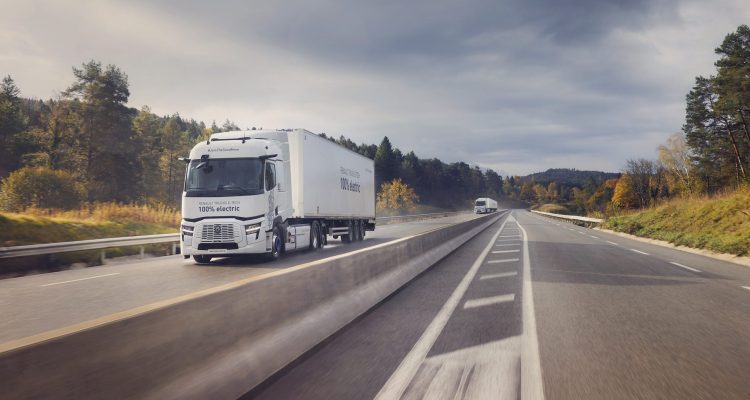Renault Trucks has expanded its electric heavy-duty portfolio with the launch of two advanced models: the Renault Trucks E-Tech T 585 and the flagship Renault Trucks E-Tech T 780. Both versions set new standards for long-distance zero-emission haulage, delivering ranges of up to 460 km and 600 km respectively on a single charge. Designed to meet the evolving needs of UK and European logistics operators, the new models provide greater range, enhanced energy efficiency and improved charging capabilities. They join the updated Renault Trucks E-Tech T 540 4×2, which also receives a boosted driving range.
A tailored approach to long-distance electric haulage
Renault Trucks is positioning each new model with a clear operational focus. The E-Tech T 780 prioritises maximum range, making it the ideal option for long-haul operators adopting electric fleets for trunking and intercity transport. Meanwhile, the E-Tech T 585 offers the best payload capacity in the line-up, aimed at fleets where weight-sensitive operations are key. The E-Tech T 540 4×2 remains dedicated to regional distribution and now benefits from a revised architecture enabling up to 450 km on a single charge.
Together, these models give hauliers more choice than ever as the industry accelerates towards decarbonised long-distance freight.
Innovative technology boosts performance and range
A major contributor to the improved range of the E-Tech T 585 and T 780 is Renault Trucks’ use of an integrated electric axle (E-axle). This design places the electric motors and transmission at the rear of the vehicle, freeing up chassis space for additional battery packs. By optimising packaging in this way, Renault Trucks can install higher-capacity battery systems without compromising weight distribution or vehicle dynamics.
The trucks are equipped with new high-energy-density NCA (Nickel, Cobalt, Aluminium) lithium-ion batteries. Their distinctive L-shaped design fits neatly within the new chassis layout, improving structural integration and durability. Renault Trucks guarantees the battery performance for up to eight years or 1 million kilometres, giving hauliers confidence in long-term usability and total cost of ownership.
The E-Tech T 585 features 585 kWh of installed battery capacity, delivering up to 460 km* on a single charge and providing the best payload in the series. The E-Tech T 780 houses an impressive 780 kWh battery system, enabling ranges of up to 600 km*—a milestone for the brand’s long-haul electric capabilities. These solutions demonstrate Renault Trucks’ commitment to balancing range, payload and operational flexibility.
Faster charging for improved operational efficiency
To help operators maximise productivity, both the E-Tech T 585 and T 780 are compatible with the ultra-fast Megawatt Charging System (MCS). With charging capability up to 720 kW, these trucks can recover as much as 350 km of driving range during a standard 45-minute driver rest break. For logistics businesses operating strict schedules, this makes long-distance electric haulage significantly more viable.
Depot charging is supported via the widely used CCS standard, allowing charging speeds of up to 350 kW. This flexibility ensures that fleets can integrate the trucks into existing charging infrastructure while preparing for the rollout of MCS networks across Europe.
Comfort, stability and manoeuvrability for long-haul drivers
Renault Trucks has developed the new 6×2 tractor versions of the E-Tech T 585 and T 780 with long-distance comfort at the forefront. The addition of a steerable and liftable rear axle improves manoeuvrability, giving these 6×2 models turning characteristics comparable to a 4×2 tractor. This design also reduces tyre wear on return journeys when operating with light or empty trailers, supporting lower operating costs and reduced downtime.
The cab environment prioritises driver comfort, with enhancements to seating, climate control and ergonomics designed to support long hours behind the wheel. Combined with the smooth, quiet operation typical of electric powertrains, the driving experience represents a significant upgrade for long-haul drivers transitioning from diesel.
A full suite of services to maximise uptime and fleet efficiency
Beyond the vehicles themselves, Renault Trucks continues to invest in a robust service ecosystem to support hauliers adopting electric technology.
Optifleet
The Optifleet fleet management system provides real-time telematics, route planning, performance monitoring and charging oversight. For operators transitioning from diesel, the platform offers the data-driven insights needed to optimise range and charging schedules.
Serenity Pack
This dedicated electromobility support package gives fleets enhanced monitoring and expert guidance from Renault Trucks specialists during the first year of operation. The aim is to streamline the adoption process and ensure vehicles deliver maximum performance from day one.
Driver App
The mobile app enables drivers to remotely check charging status, pre-condition the cab and battery, and prepare the vehicle before starting each shift. By ensuring the truck is at the right temperature and charge level at departure, the app supports optimal range and energy efficiency.
E-Tech Programme consultancy
Renault Trucks’ consultancy service provides operators with access to specialist expertise in decarbonisation planning. This includes detailed route and fleet analysis, predictions of CO₂ savings, energy capacity assessments and tailored roadmap development. For hauliers moving towards net-zero, this guidance is invaluable as infrastructure and operational models evolve.
Manufactured in France and available to order now
All three models—the Renault Trucks E-Tech T 585, E-Tech T 780 and updated E-Tech T 540—will be built at Renault Trucks’ Bourg-en-Bresse assembly plant. The facility has produced electric heavy-duty trucks since late 2023 and continues to scale production as demand for zero-emission haulage grows across Europe.
The new models are available to order immediately, giving hauliers the opportunity to modernise their fleets with vehicles capable of delivering long-distance electric performance without compromising payload, comfort or operational efficiency.
* Range may vary depending on operating conditions, route topography, payload, weather and driving behaviour.






